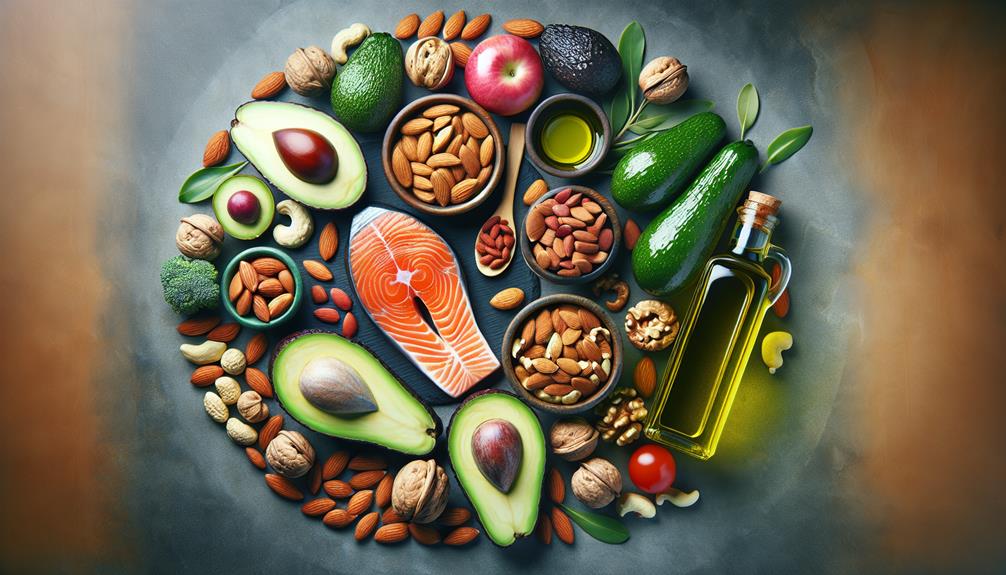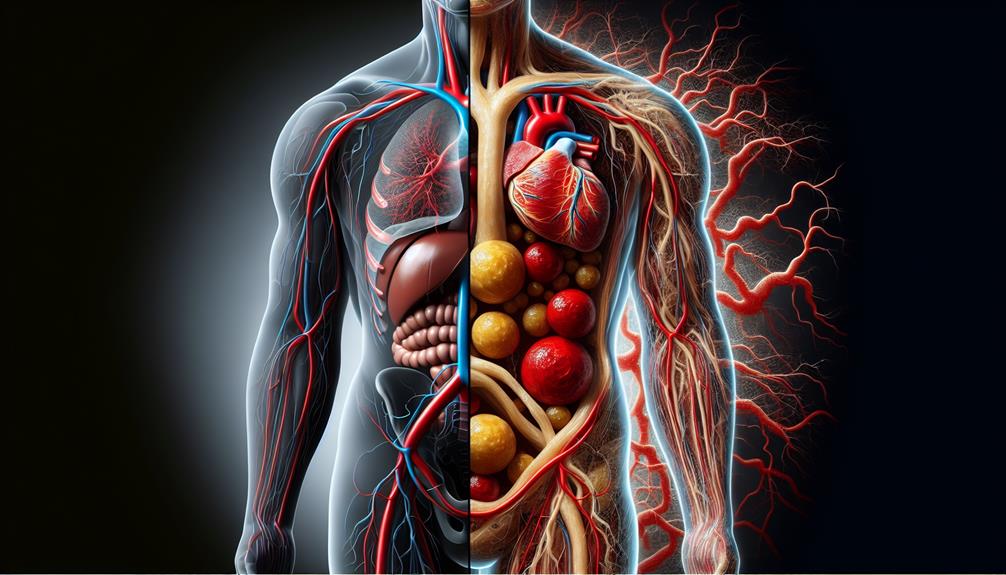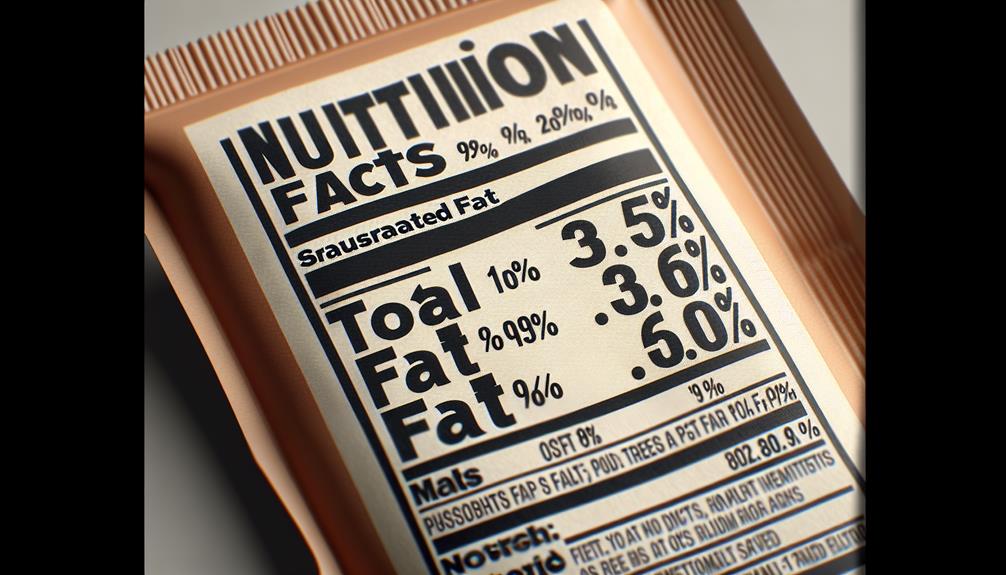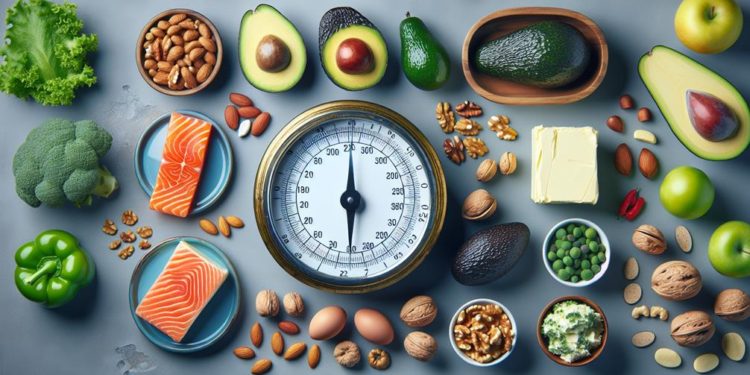Imagine your body as a complex machine, with fats serving as the oil that keeps everything running smoothly. But just like there are different grades of oil, not all fats are created equal. In this discussion, we will explore the world of fats, dissecting the various types and uncovering the truth behind healthy fats versus harmful ones. Are you ready to discover the secrets to fueling your body with the right fats? Let's dive in and unravel the mysteries together.
Key Takeaways
- Not all fats are bad; some fats are necessary for optimal health.
- Including healthy fats in your diet can help with weight management and reduce cravings.
- Trans fats and saturated fats should be avoided as they increase the risk of heart disease.
- Reading food labels and identifying harmful fats is important for making informed choices for a balanced diet.
The Basics of Fats
Understanding the basics of fats is crucial for maintaining a healthy diet and lifestyle. Fats play an important role in our bodies and are an essential part of a balanced diet. Contrary to popular belief, not all fats are bad for you. In fact, some fats are necessary for optimal health.
One of the myths about fats is that all fats should be avoided. This is simply not true. While it is important to limit the intake of saturated and trans fats, there are healthy fats that are beneficial for our bodies. These include monounsaturated and polyunsaturated fats, which can be found in foods like avocados, nuts, and oily fish.
Healthy fats are important for a variety of reasons. They provide energy, help absorb fat-soluble vitamins, and support cell growth. Additionally, they play a crucial role in brain function and hormone production. Including healthy fats in your diet can also help you feel full and satisfied, which can prevent overeating and aid in weight management.
Understanding Different Types of Fats
To further expand your knowledge on fats, let's now explore the different types of fats and their impact on your health and well-being. When it comes to cardiovascular health, not all fats are created equal. Saturated and trans fats are considered harmful as they can raise LDL cholesterol levels, increasing the risk of heart disease. On the other hand, unsaturated fats, including monounsaturated and polyunsaturated fats, have been shown to have a positive impact on heart health. These healthy fats can help lower LDL cholesterol levels and reduce the risk of cardiovascular diseases.
Incorporating healthy fats into your diet can also benefit weight management. Healthy fats are more satiating than carbohydrates or unhealthy fats, which means they can help you feel fuller for longer. This can lead to a reduction in overall calorie intake, aiding in weight loss or weight maintenance. Additionally, healthy fats can help regulate blood sugar levels and improve insulin sensitivity, which is important for managing diabetes and preventing weight gain.
Identifying Healthy Fats

To identify healthy fats, you can focus on incorporating monounsaturated and polyunsaturated fats into your diet. These types of fats have been shown to have numerous benefits for your health. Monounsaturated fats, found in foods like avocados, olive oil, and nuts, can help lower bad cholesterol levels and reduce the risk of heart disease. Polyunsaturated fats, found in fatty fish like salmon, as well as in walnuts and flaxseed, are rich in omega-3 fatty acids, which have anti-inflammatory properties and can help protect against heart disease and stroke.
In addition to their heart-healthy benefits, these fats are also important for brain health. Omega-3 fatty acids, in particular, are crucial for optimal brain function and development. Including sources of healthy fats in your diet can also help with weight management, as they can help you feel fuller for longer and reduce cravings for unhealthy snacks.
To incorporate more healthy fats into your diet, try using olive oil for cooking, adding avocados to your salads, snacking on nuts, and including fatty fish like salmon or trout in your meals. By making these simple changes, you can enjoy the numerous benefits that healthy fats have to offer.
Harmful Fats to Avoid
Cutting out harmful fats from your diet is essential for maintaining good health and reducing the risk of chronic diseases. Harmful fats can have negative effects on cardiovascular health, increasing the risk of heart disease and stroke. To help you identify and avoid these fats, here are four common sources of harmful fats in the modern diet:
- Trans fats: These fats are commonly found in processed foods, such as fried and baked goods, snacks, and margarine. Trans fats have been shown to raise bad cholesterol levels and lower good cholesterol levels, increasing the risk of heart disease.
- Saturated fats: These fats are primarily found in animal products like fatty meats, full-fat dairy products, and butter. Consuming high amounts of saturated fats can lead to elevated levels of bad cholesterol, which can contribute to the development of heart disease.
- High-fat processed meats: Processed meats like sausages, hot dogs, and bacon are high in saturated fats and often contain added sodium and preservatives. Regular consumption of these meats has been linked to an increased risk of heart disease and certain types of cancer.
- Deep-fried foods: Foods that are deep-fried, such as french fries, fried chicken, and doughnuts, are typically cooked in unhealthy oils that are high in trans fats and saturated fats. These fats can raise bad cholesterol levels and contribute to inflammation in the body.
The Impact of Fats on Your Body

Consuming a variety of fats can have a significant impact on your body's overall health and well-being. Fats play a crucial role in brain health, as they are essential for the proper functioning of the brain. The brain is composed of about 60% fat, and it relies on fats for energy, insulation, and protection. Omega-3 fatty acids, found in fatty fish, walnuts, and flaxseeds, are particularly important for brain health, as they can improve cognitive function and reduce the risk of neurodegenerative diseases.
However, it is important to be mindful of the types of fats you consume, as some fats can contribute to inflammation in the body. Inflammation is the body's natural response to injury or infection, but chronic inflammation can lead to various health problems, including heart disease, diabetes, and arthritis. Trans fats and saturated fats, commonly found in processed foods, fried foods, and fatty meats, are known to increase inflammation in the body. On the other hand, monounsaturated fats, found in olive oil, avocados, and nuts, and polyunsaturated fats, found in fatty fish, seeds, and vegetable oils, have anti-inflammatory properties and can help reduce inflammation in the body.
Tips for Incorporating Healthy Fats Into Your Diet
Incorporating healthy fats into your diet is essential for maintaining optimal health and well-being. To help you incorporate more healthy fats into your daily meals, here are four tips:
- Cook with avocado oil: Avocado oil is rich in monounsaturated fats, which are known to promote heart health. It has a high smoke point, making it suitable for cooking at high temperatures without losing its nutritional value. Use it for sautéing, roasting, or as a salad dressing base.
- Add fatty fish to your menu: Fatty fish such as salmon, sardines, and mackerel are excellent sources of omega-3 fatty acids. These essential fats have been shown to reduce inflammation, improve brain health, and support heart health. Aim for at least two servings of fatty fish per week.
- Snack on nuts and seeds: Nuts and seeds are packed with healthy fats, fiber, and a variety of essential nutrients. Incorporate almonds, walnuts, chia seeds, or flaxseeds into your diet by adding them to smoothies, yogurt, or salads for a satisfying and nutritious snack.
- Include whole eggs in your meals: Contrary to popular belief, whole eggs are a nutrient-dense food that provides healthy fats, protein, vitamins, and minerals. They contain omega-3 fatty acids, especially when sourced from pasture-raised chickens. Enjoy eggs as part of your breakfast or incorporate them into your favorite dishes.
Making Informed Choices: Reading Food Labels

To make informed choices about the foods you consume, it is important to know how to read food labels accurately. Reading food labels can help you identify any food label deception and hidden fats that may be lurking in your favorite snacks or meals. Food label deception refers to misleading information on food packaging that may mislead consumers about the true nutritional content of a product. Hidden fats, on the other hand, are fats that are not easily recognizable by their name on food labels, making it crucial to familiarize yourself with the various names used for different types of fats.
When reading food labels, start by checking the serving size and the number of servings per container. This will give you an accurate understanding of the nutritional information provided. Next, focus on the total fat content and the types of fats listed. Look out for terms like "partially hydrogenated oils" or "trans fats," as these indicate the presence of unhealthy fats.
Additionally, pay attention to the ingredient list. Ingredients are listed in descending order by weight, so if you see unhealthy fats near the beginning of the list, it's a sign that the product may contain high levels of harmful fats. Look out for terms like "palm oil," "coconut oil," or "palm kernel oil," as these are often used as hidden fats in processed foods.
Frequently Asked Questions
What Are Some Common Sources of Unhealthy Fats?
Unhealthy fats are found in processed foods, fried foods, and fatty cuts of meat. These sources increase the risk of heart disease, obesity, and high cholesterol. It's important to limit consumption of these fats for a healthier lifestyle.
Can Consuming Healthy Fats Help With Weight Loss?
Incorporating healthy fats into your diet can help with weight loss. They provide satiety, reduce cravings, and support nutrient absorption. Examples include avocados, nuts, and olive oil. Remember, moderation is key.
How Do Certain Fats Affect Cholesterol Levels?
Certain fats can affect cholesterol levels. Healthy fats, like monounsaturated and polyunsaturated fats, can help lower bad cholesterol and reduce the risk of heart disease. Harmful fats, like trans fats, can raise bad cholesterol and increase the risk of cardiovascular diseases.
Are There Any Health Conditions That Can Be Worsened by Consuming Certain Types of Fats?
Certain types of fats can worsen health conditions and impact blood pressure. It's important to distinguish between healthy and harmful fats to mitigate these risks. Stay informed and make mindful choices for your well-being.
What Are Some Alternative Sources of Healthy Fats for Individuals With Dietary Restrictions?
If you have dietary restrictions, there are still alternative sources of healthy fats for you. These fats, such as avocados and nuts, can provide benefits for brain health while fitting into your dietary needs.
Conclusion
So there you have it – the secrets of sorting healthy fats from harmful ones. Who knew that something as simple as fats could have such a big impact on our bodies? But now armed with this knowledge, you can make informed choices about what you put into your body. Remember, not all fats are created equal, so choose wisely and enjoy a healthier, more balanced diet. It's ironic how something we were once told to avoid can actually be good for us.













